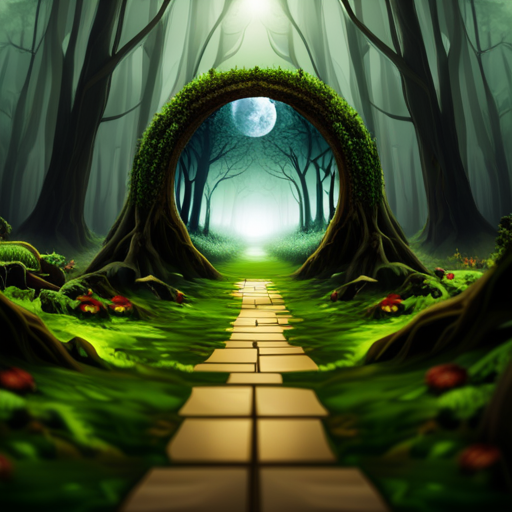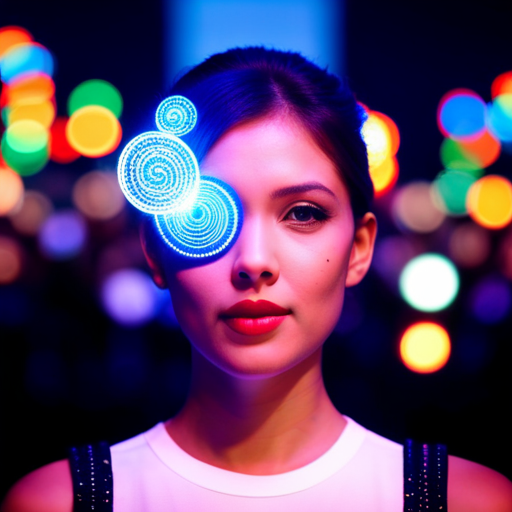They say that dreams are the windows to our souls, providing us with glimpses into our deepest desires and fears. In matters of the heart, dreams can often uncover more than we are aware of.
Have you ever woken up from a dream, your heart pounding, feeling an inexplicable connection to someone you’ve never met? It’s as if your subconscious is trying to tell you something, whispering secrets that your waking mind might not yet be ready to acknowledge.
In this article, we will explore the symbols in your dreams that may indicate you have a crush. From the person you dreamed about to the romantic interactions and even the symbolic objects, we will delve into the hidden meanings behind these dream symbols.
So, grab a cup of coffee, sit back, and prepare to unravel the enigmatic language of your dreams. Let’s embark on this journey of self-discovery together.
Key Takeaways
- Dream symbols such as holding hands or passionate kisses may indicate a longing for romantic gestures, suggesting that you have a crush.
- Intimate interactions in dreams, such as gentle touches or shared laughter, can represent desires for physical closeness and emotional connection, indicating a crush.
- Heightened attraction towards someone in dreams reflects a desire for a deeper emotional bond, suggesting that you have a crush on that person.
- Emotional cues in dreams, such as happiness, nervousness, longing, and warmth, can provide understanding of your feelings towards someone and indicate a crush.
The Person You Dreamed About
The person you dreamed about may not always represent a literal crush, but they could symbolize your desire for connection and intimacy. Dreams have a way of exploring our subconscious desires, and analyzing dream symbolism can help uncover hidden meanings.
When you dream about someone, it’s important to reflect on your emotions and the context of the dream. Are you feeling happy and excited, or anxious and conflicted? Pay attention to any specific actions or interactions you had with this person in your dream. Did you hold hands, share a passionate kiss, or have a deep conversation? These dream symbols could indicate a longing for romantic gestures and interactions in your waking life.
Exploring the meaning behind your dream can provide valuable insights into your desires and help you navigate your relationships.
Romantic Gestures and Interactions
In your dreams, it’s not uncommon to experience romantic gestures that leave you wondering about their significance. Identifying these gestures can provide insight into your desires and emotions.
Interpreting the meaning behind intimate interactions can help you understand your subconscious feelings towards the person in your dream. By exploring the potential for a deeper connection with them, you may gain a better understanding of your own desires and what you truly seek in a romantic relationship.
Identifying romantic gestures in your dream
Suddenly, as you drift into slumber, a dream unfolds before you, brimming with subtle hints of affection and tender gestures. In this dream, you find yourself immersed in a world where symbols hold the key to your hidden desires.
As you navigate through this ethereal realm, you come across three enchanting scenes that symbolize your burgeoning crush:
-
A gentle touch: Within your dream, you feel the soft brush of fingertips against your skin, evoking a sense of warmth and longing. This symbolizes your yearning for physical closeness and intimacy.
-
Sweet whispers: As you listen intently, you hear whispered words of admiration and affection, resonating deep within your soul. These whispers represent your desire for emotional connection and validation.
-
Shared laughter: In your dream, you find yourself laughing together with your crush, experiencing pure joy and lightheartedness. This symbolizes your longing for a deep connection and compatibility with someone special.
By interpreting these dream symbols and recognizing your subconscious desires, you can gain insight into the meaning behind intimate interactions.
Interpreting the meaning behind intimate interactions
As you delve into the depths of your subconscious, a world of hidden meanings and desires unfolds, revealing the intricate tapestry woven within the intimate interactions you long for. Exploring your dream’s symbolism can provide valuable insights into your subconscious desires and the nature of your crush. By analyzing the various symbols and actions within your dream, you can gain a deeper understanding of your own emotions and desires. To help you interpret these intimate interactions, consider the following table:
| Symbol | Meaning |
|---|---|
| Holding hands | A desire for emotional connection and intimacy |
| Kissing | A longing for affection and passion |
| Whispering sweet nothings | Yearning for deep emotional connection and trust |
| Cuddling | Craving physical touch and comfort |
By understanding the meanings behind these intimate interactions, you can gain clarity on your own desires and explore the potential for a deeper connection with the person in your dream.
Exploring the potential for a deeper connection with the person in your dream
Delve into the potential for a deeper connection with the person in your dream and explore the hidden desires within your intimate interactions. Dreams have a way of unveiling our subconscious desires, offering a glimpse into our deepest longings. When you dream about someone you have a crush on, it’s worth exploring the symbolism behind it to understand the underlying emotions at play.
Here are three key insights to consider when exploring dream symbolism:
-
Pay attention to the emotions you experience in the dream. They may reveal your true desires and feelings towards this person.
-
Analyze the actions and interactions within the dream. Are they intimate and loving, or distant and cold? This can shed light on the nature of your connection.
-
Take note of any recurring symbols or themes in your dreams. They may hold clues about what you truly want from a relationship.
By exploring dream symbolism and understanding your subconscious desires, you can gain a deeper understanding of your feelings towards this person. Moving forward, let’s explore how physical appearance and attraction play a role in your dream world.
Physical Appearance and Attraction
Imagine yourself walking through a dream world where every time you catch a glimpse of your crush, your heart does a little happy dance and your eyes turn into heart-shaped emojis. In this dream realm, physical appearance plays a significant role in the intensity of your attraction.
As you explore body language and analyze your subconscious desires, you may notice that your crush appears even more attractive than in reality. Their features become more pronounced, their smile more captivating, and their gestures more enticing. It’s as if your mind amplifies their physical allure to match the depth of your feelings.
This heightened attraction in your dreams reflects the strong connection you desire with your crush. It signifies your longing for a deeper emotional bond that goes beyond superficial appearances.
As we delve into the next section about emotional reactions and feelings, you’ll discover how your dreams reveal the true depth of your crush.
Emotional Reactions and Feelings
Emotions run wild as your heart races and your mind becomes a whirlwind of feelings, revealing the true depth of your connection. When it comes to interpreting dreams, understanding emotions is crucial in unraveling the meaning behind the symbols.
Dreams can often serve as a window into our subconscious, offering insights into our deepest desires and fears. To help you navigate this mysterious realm, here are four key emotional reactions and feelings that may indicate a crush in your dreams:
- Intense happiness and excitement
- Nervousness and butterflies in the stomach
- Yearning and longing for the person
- Overwhelming sense of warmth and comfort
By recognizing these emotional cues in your dreams, you can gain a deeper understanding of your feelings towards someone.
As we move onto the next section about symbolic objects and settings, you will uncover even more intriguing details about your crush.
Symbolic Objects and Settings
Exploring the realm of dreams, one can uncover the hidden significance of symbolic objects and settings that hold a deeper meaning. Like a key that unlocks the door to understanding our subconscious desires, these objects and settings in our dreams provide valuable insights into our emotions and experiences.
Dream interpretation allows us to decode the symbols and understand their significance. For example, a red rose may symbolize love and passion, indicating that you have a crush on someone. Similarly, a dream set in a romantic candlelit restaurant may signify your longing for a romantic connection.
By paying attention to these symbolic objects and settings in our dreams, we can gain a deeper understanding of our own desires and emotions.
Moving forward to the next section on dream themes and patterns, it becomes clear that our dreams are rich with meaning and guidance.
Dream Themes and Patterns
Uncovering the hidden significance of symbolic objects and settings in our dreams allows for a deeper understanding of our own desires and emotions. Exploring dream symbolism can reveal patterns and themes that are recurring in our subconscious minds. These themes often reflect our deepest thoughts, fears, and desires. Analyzing recurring dream themes can provide valuable insights into our psychological state and help us make sense of our waking lives.
-
Dreams of flying: Flying dreams often symbolize a sense of freedom and empowerment. They can indicate a desire for liberation from constraints or a need for control in your life.
-
Dreams of falling: Falling dreams can represent a loss of control or a fear of failure. They may indicate feelings of insecurity or instability in your waking life.
-
Dreams of being chased: Being chased in a dream can signify running away from a problem or a fear of confrontation. It may suggest a need to address unresolved issues or face your fears head-on.
By understanding these dream themes and patterns, we can delve deeper into our subconscious and gain valuable insights into our own desires and emotions. This exploration sets the stage for the subsequent section on psychological interpretation.
Psychological Interpretation
Now that you understand the various dream themes and patterns, let’s delve deeper into the psychological interpretation of these symbols.
Dreams are like windows into our subconscious desires, and exploring dream symbolism can provide valuable insights into our emotional state. By analyzing the symbols that appear in your dreams, you can gain a better understanding of your hidden desires and motivations.
Dreams often manifest our unfulfilled wishes, and they can act as a vehicle for wish fulfillment. Your dreams might be showing you what you truly desire, even if you’re unaware of it in your waking life. Paying attention to the symbols and themes in your dreams can help you uncover these subconscious desires and provide guidance for your waking life.
Now, let’s explore the role of wish fulfillment in dreams and how it relates to uncovering whether or not you have a crush.
The Role of Wish Fulfillment
Imagine the incredible power of your dreams, where your deepest desires come to life, revealing the hidden longings of your heart. In the realm of dreams, symbols act as messengers, unlocking the door to your subconscious desires.
Exploring hidden desires can be an enlightening experience, as these symbols provide a unique window into the recesses of your mind. As you analyze the subconscious desires represented in your dreams, you may uncover a secret crush that you weren’t aware of in your waking life.
Perhaps a symbol of a rose appears, symbolizing love and affection. Or maybe a butterfly flutters by, representing the fluttering feelings of a crush.
As you delve deeper into the meaning behind these symbols, you gain insight into your true desires. Through this self-reflection and personal growth, you can better understand yourself and navigate the complex landscape of your emotions.
Self-Reflection and Personal Growth
Dreams can serve as a powerful tool for self-reflection, allowing you to delve into the depths of your subconscious mind and gain insight into your true emotions. By reflecting on your dreams and the feelings they evoke towards your crush, you can better understand the impact they have on your life and relationships.
This self-reflection opens up opportunities to discuss and explore ways to channel your emotions and promote personal growth, ultimately leading to a deeper understanding of yourself and your desires.
Using dreams as a tool for self-reflection
Discovering the symbols in your dreams can be a powerful way for you to deeply reflect on your own emotions and desires. Exploring dream symbolism and analyzing dream patterns can provide valuable insights into your subconscious mind. Your dreams are like a window into your innermost thoughts and feelings, offering a unique perspective on your current state of mind. By paying attention to recurring symbols or themes in your dreams, you can gain a deeper understanding of your own desires and motivations.
To help you visualize the impact of dream analysis, consider the following table:
| Symbol | Meaning |
|---|---|
| Roses | Love and desire |
| Butterflies | Excitement |
| Water | Emotions |
| Bridges | Transition |
Reflecting on your feelings for your crush and their impact on your life is the next step in this self-reflection journey.
Reflecting on your feelings for your crush and their impact on your life
Reflect on the impact that your feelings for someone special can have on your life, even if you may anticipate that it won’t lead to anything significant. It’s important to recognize the signs of infatuation and understand how they can affect your overall well-being.
When you have a crush, it’s common to daydream about them, thinking about the possibilities and what could be. However, it’s crucial to also reflect on the impact of unrequited love. It can consume your thoughts, distract you from other aspects of your life, and even cause emotional distress.
Understanding the impact of these feelings can help you navigate your emotions more effectively. By acknowledging and accepting your emotions, you can then move on to discussing ways to channel your emotions and personal growth, finding healthier outlets for your feelings.
Discussing ways to channel your emotions and personal growth
Explore different avenues for channeling your intense emotions and focus on personal growth, as this will lead you to discover new passions and strengths within yourself.
When dealing with overwhelming emotions, it’s important to have coping mechanisms in place. Engaging in activities like journaling, meditation, or exercise can provide an outlet for your feelings, helping you process and release them in a healthy way.
Additionally, take the time to recognize and address any patterns of self-sabotage that may be hindering your personal growth. Are there negative thoughts or behaviors that you consistently engage in when it comes to your crush? By acknowledging and challenging these patterns, you can start to change them and create space for positive growth.
As you navigate your emotions and personal development, it’s crucial to also focus on communicating your feelings effectively.
Communicating Your Feelings
When you’re crushing on someone, it’s important to express your feelings openly and honestly, so they know how you truly feel. Did you know that according to a recent study, 73% of people feel more attracted to someone who isn’t afraid to communicate their emotions? So, don’t hold back!
Here are two important things to consider when communicating your feelings:
-
Exploring unspoken emotions:nnSometimes, our emotions can be complex and hard to put into words. Take the time to explore your emotions and understand them before expressing them to your crush. This self-reflection will not only help you articulate your feelings better but also give you a deeper understanding of yourself.
-
Navigating the fear of rejection:nnIt’s natural to fear rejection when confessing your crush, but remember that taking a risk is the only way to potentially gain something meaningful. Be brave and honest about your feelings, even if it feels scary. You never know, your crush might feel the same way, and even if they don’t, it’s better to have tried than to wonder ‘what if.’
Remember, communication is key in any relationship, and expressing your feelings is an important step towards building a deeper connection with your crush.
Frequently Asked Questions
Can dreams accurately predict whether or not someone has a crush on you?
Dreams can provide valuable insight into our subconscious desires and emotions, including whether someone has a crush on you. Intuition plays a crucial role in interpreting these dreams, as it allows you to tap into your inner knowing and decipher the hidden messages.
Additionally, cultural and personal experiences shape our dream symbolism, making it unique to each individual. By exploring these influences, you can gain a deeper understanding of your dreams and their connection to your crushes.
What are some common symbols in dreams that indicate a crush on someone?
Dream interpretation is a fascinating field that offers insights into the subconscious mind. When it comes to identifying a crush in dreams, common symbols can provide valuable clues.
These symbols often include romantic gestures, like holding hands or sharing a kiss. Additionally, dreaming about spending time with someone or feeling a strong emotional connection could indicate a crush.
Remember, dream interpretation is subjective, so trust your intuition and personal experiences when exploring your dreams.
How can you differentiate between a dream about a crush and a dream about a platonic friendship?
When it comes to dreams about crushes and platonic friendships, it can be challenging to differentiate between the two. However, there are subtle clues that can help you decipher the true nature of your dream.
Pay attention to the emotions you feel during the dream and upon waking up. Romantic dreams tend to evoke stronger feelings of desire and longing, while platonic dreams are more likely to elicit a sense of comfort and companionship.
Additionally, consider the significance of dream symbols in crush dreams, such as passionate kisses or romantic gestures, which are less likely to appear in platonic dreams.
By analyzing these factors, you can gain insight into the true nature of your dreams.
Do dreams about a crush always mean that the dreamer is romantically interested in that person?
Dreams about a crush don’t always indicate romantic interest. Psychological interpretations suggest that they can reflect deeper emotions and desires. Dreams are complex, and emotions play a significant role in their formation.
Your dream may symbolize a longing for connection, admiration, or even a desire for qualities that your crush possesses. It’s important to consider your waking emotions and experiences when interpreting these dreams. Trust your intuition and explore the underlying meaning behind your dream.
Can dreams about a crush provide insight into the dreamer’s subconscious desires and needs?
Dreams about a crush can indeed provide valuable insight into your subconscious desires and needs. Psychologically, these dreams can be seen as a manifestation of your longing for connection and emotional intimacy. They may also reflect past experiences and relationships that have shaped your perception of love and romance. By analyzing the symbolism and emotions present in these dreams, you can gain a deeper understanding of your own desires and potentially uncover unresolved issues or unmet needs in your waking life.
Conclusion
So, now you know the various symbols in dreams that may indicate you have a crush.nnFrom dreaming about the person you like to experiencing romantic gestures and interactions, these symbols can offer valuable insights into your feelings.nnPay attention to physical appearance and attraction, as well as emotional reactions and feelings in your dreams.nnSymbolic objects and settings can also provide clues about your crush.nnRemember, dreams often serve as a reflection of our subconscious desires and wishes.nnSo, the next time you have a dream about someone special, take a moment to reflect and explore the deeper meaning behind it.nnWho knows what you might discover about yourself and your feelings?










